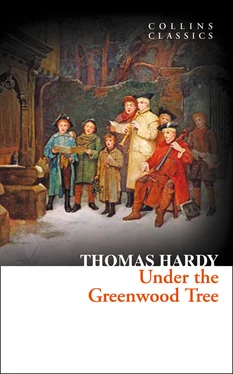UNDER THE GREENWOOD TREE
Thomas Hardy
CONTENTS
Title Page UNDER THE GREENWOOD TREE Thomas Hardy
History of Collins History of Collins In 1819, millworker William Collins from Glasgow, Scotland, set up a company for printing and publishing pamphlets, sermons, hymn books and prayer books. That company was Collins and was to mark the birth of HarperCollins Publishers as we know it today. The long tradition of Collins dictionary publishing can be traced back to the first dictionary William published in 1824, Greek and English Lexicon . Indeed, from 1840 onwards, he began to produce illustrated dictionaries and even obtained a licence to print and publish the Bible. Soon after, William published the first Collins novel, Ready Reckoner , however it was the time of the Long Depression, where harvests were poor, prices were high, potato crops had failed and violence was erupting in Europe. As a result, many factories across the country were forced to close down and William chose to retire in 1846, partly due to the hardships he was facing. Aged 30, William’s son, William II took over the business. A keen humanitarian with a warm heart and a generous spirit, William II was truly ‘Victorian’ in his outlook. He introduced new, up-to-date steam presses and published affordable editions of Shakespeare’s works and Pilgrim’s Progress , making them available to the masses for the first time. A new demand for educational books meant that success came with the publication of travel books, scientific books, encyclopaedias and dictionaries. This demand to be educated led to the later publication of atlases and Collins also held the monopoly on scripture writing at the time. In the 1860s Collins began to expand and diversify and the idea of ‘books for the millions’ was developed. Affordable editions of classical literature were published and in 1903 Collins introduced 10 titles in their Collins Handy Illustrated Pocket Novels. These proved so popular that a few years later this had increased to an output of 50 volumes, selling nearly half a million in their year of publication. In the same year, The Everyman’s Library was also instituted, with the idea of publishing an affordable library of the most important classical works, biographies, religious and philosophical treatments, plays, poems, travel and adventure. This series eclipsed all competition at the time and the introduction of paperback books in the 1950s helped to open that market and marked a high point in the industry. HarperCollins is and has always been a champion of the classics and the current Collins Classics series follows in this tradition – publishing classical literature that is affordable and available to all. Beautifully packaged, highly collectible and intended to be reread and enjoyed at every opportunity.
Life & Times
Part The First Winter
Chapter 1 Mellstock Lane
Chapter 2 The Tranter’s
Chapter 3 The Assembled Quire
Chapter 4 Going the Rounds
Chapter 5 The Listeners
Chapter 6 Christmas Morning
Chapter 7 The Tranter’s Party
Chapter 8 They Dance More Wildly
Chapter 9 Dick Calls at the School
Part The Second Spring
Chapter 1 Passing by the School
Chapter 2 A Meeting of the Quire
Chapter 3 A Turn in the Discussion
Chapter 4 The Interview with the Vicar
Chapter 5 Returning Homeward
Chapter 6 Yalbury Wood and the Keeper’s House
Chapter 7 Dick Makes Himself Useful
Chapter 8 Dick Meets His Father
Part The Third Summer
Chapter 1 Driving Out of Budmouth
Chapter 2 Further Along the Road
Chapter 3 A Confession
Chapter 4 An Arrangement
Part The Fourth Autumn
Chapter 1 Going Nutting
Chapter 2 Honey-taking, and Afterwards
Chapter 3 Fancy in the Rain
Chapter 4 The Spell
Chapter 5 After Gaining Her Point
Chapter 6 Into Temptation
Chapter 7 Second Thoughts
Part The Fifth Conclusion
Chapter 1 “The Knot there’s no Untying”
Chapter 2 Under the Greenwood Tree
Classic Literature: Words and Phrases adapted from the Collins English Dictionary
Copyright
About the Publisher
In 1819, millworker William Collins from Glasgow, Scotland, set up a company for printing and publishing pamphlets, sermons, hymn books and prayer books. That company was Collins and was to mark the birth of HarperCollins Publishers as we know it today. The long tradition of Collins dictionary publishing can be traced back to the first dictionary William published in 1824, Greek and English Lexicon . Indeed, from 1840 onwards, he began to produce illustrated dictionaries and even obtained a licence to print and publish the Bible.
Soon after, William published the first Collins novel, Ready Reckoner , however it was the time of the Long Depression, where harvests were poor, prices were high, potato crops had failed and violence was erupting in Europe. As a result, many factories across the country were forced to close down and William chose to retire in 1846, partly due to the hardships he was facing.
Aged 30, William’s son, William II took over the business. A keen humanitarian with a warm heart and a generous spirit, William II was truly ‘Victorian’ in his outlook. He introduced new, up-to-date steam presses and published affordable editions of Shakespeare’s works and Pilgrim’s Progress , making them available to the masses for the first time. A new demand for educational books meant that success came with the publication of travel books, scientific books, encyclopaedias and dictionaries. This demand to be educated led to the later publication of atlases and Collins also held the monopoly on scripture writing at the time.
In the 1860s Collins began to expand and diversify and the idea of ‘books for the millions’ was developed. Affordable editions of classical literature were published and in 1903 Collins introduced 10 titles in their Collins Handy Illustrated Pocket Novels. These proved so popular that a few years later this had increased to an output of 50 volumes, selling nearly half a million in their year of publication. In the same year, The Everyman’s Library was also instituted, with the idea of publishing an affordable library of the most important classical works, biographies, religious and philosophical treatments, plays, poems, travel and adventure. This series eclipsed all competition at the time and the introduction of paperback books in the 1950s helped to open that market and marked a high point in the industry.
HarperCollins is and has always been a champion of the classics and the current Collins Classics series follows in this tradition – publishing classical literature that is affordable and available to all. Beautifully packaged, highly collectible and intended to be reread and enjoyed at every opportunity.
About the Author
Thomas Hardy was born in a Dorset village in 1840. Although he had a modest upbringing, Hardy found himself working successfully as an architect in London at the age of 22. He spent five years in London, but was eventually drawn back to Dorset because he did not enjoy the urban environment or the class prejudice he felt, mixing with the well-heeled of England’s capital city. Having returned to the countryside, he began to consider an alternative career as a novelist. By 1867, he had already completed a manuscript, but had no luck placing it with a publisher. Despite this, his ambition knew no bounds and he persevered securing his first publication in 1871. His first five novels were well received, and Hardy’s confidence in pushing the literary envelope grew steadily.
Читать дальше












